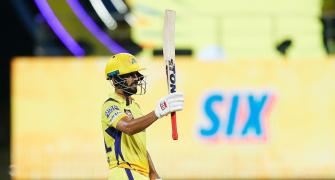Do you have mutual fund queries?
Please ask your questions here and rediffGURU Dev Ashish, founder, StableInvestor (external link), will answer them.

Anonymous: I have a monthly SIP of Rs 5,000 each in Mirae Tax Saver Fund, Nippon Small Cap Fund, Axis Mid Cap Fund, HDFC Flexi Cap Fund, HDFC Balanced Advantage Fund and Kotak Emerging Equity Fund.
Also monthly SIP of Rs 4,000 each in ICICI Multi Asset Fund, HSBC Large & Midcap Fund and Aditya Birla Sunlife Frontline Equity fund.
Please review my portfolio. My investment horizon is 7 to 10 years. Thanks.
You don't need to invest in so many schemes. Just investing the same monthly amount in up to three funds would be sufficient.
You can pick one each from a large cap index fund, flexicap fund and midcap fund; that should be sufficient.
If you want to further have some exposure to small caps, only then go for a standalone small cap fund; otherwise not required for most people.
Rajiv: In which MF I should start SIP of Rs 10,000 for next 10 years span time.
My target amount to be accumulated is Rs 1 cr.
To reach Rs 1 cr in 10 years, you need to invest Rs 42,000-48,000 per month at 10-12 per cent average returns.
If you are able to increase your monthly investments by at least 7 per cent each year, then this requirement (at the start) comes down to Rs 32,000-36,000 per month.
While it is possible to generate more than 12 per cent returns in equities, it is not easy to do that and most people will be unable to achieve it consistently. So better to invest with reasonable expectations and also try to increase your investment amount to a higher amount if possible.
Richa: I am a 38 year old female. I want to invest Rs 5,000 per month.
I am new to MF but not certain about my job so need to invest only for 3 or 5 years.
Which can be the best plan?
If you plan to invest Rs 5,000 monthly continuously for at least 3-5 years and are ALSO willing to hold this investment for at least 5-7 years, only then consider putting money in equity funds.
You can do a monthly SIP in any good large cap index fund or flexicap fund. If you don't want to invest fully in equities, then can consider aggressive hybrid funds which invest 60-70 per cent in equities.
Do remember that when investing in these funds, you should be willing to hold on to them for at least 5-7 years even if you stop fresh investments after 3-5 years because of your job.
Also make sure you have an emergency fund in place as you have mentioned job insecurity.
Nitiksha: Should High or Low NAV of a scheme impact your investment decision?
First, low NAV doesn't mean that it's a cheaper fund.
Second, NO, cheap or low NAV is not better in mutual funds.
In reality, the NAV of a fund is irrelevant and, ideally, it shouldn't even be considered when making a decision regarding investing in mutual funds.
Let me explain in simple terms why low NAV doesn't matter at all.
Suppose two friends invest in two different mutual fund schemes having identical portfolios but their NAVs are different. One was launched several years ago and hence has a higher NAV of Rs 200. The other is a relatively new fund with a NAV of Rs 20 only. But both funds have exactly the same portfolio of stocks they invest in.
Both friends invest Rs 1 lakh. The older fund investor gets 500 units at a NAV of Rs 200 per unit. While the new fund investor gets 5,000 units at NAV of Rs 20 per unit. So it is true that lower NAV would give you more units while higher NAV would give you a lesser number of units.
Now let's say that both funds rise by the same 20 per cent. Since the portfolio is the same, the fund appreciation will be the same as well.
A 20 per cent rise in the older fund will increase its NAV from Rs 200 to Rs 240. While that of the newer fund will increase from Rs 20 to Rs 24.
At the face of it, you might say that the older fund has risen by Rs 40 while the newer one has risen by Rs 4 only. But that is not the right way to look at it. You need to compare the value of your investment.
The older fund investor, who has 500 units (purchased at Rs 200 per unit) will see her/his investment increase from Rs 1 lakh to Rs 1.2 lakh due to the rise in NAV from Rs 200 to Rs 240.
Not surprisingly, the new fund investor who has 5,000 units (purchased at Rs 20 per unit) will also see her/his investment increase from Rs 1 lakh to Rs 1.2 lakh due to the rise in NAV from Rs 20 to Rs 24.
So, despite the difference in the number of units held due to different investment NAVs, the eventual value of the investment is the same.
This is the reason that the concept of low NAV or high NAV when it comes to investing in mutual funds is irrelevant.
What only matters is the future per cent increase in NAV. That's it.
Mutual fund schemes should not be judged on their NAVs but on their performance.
This confusion about low NAV vs high NAV arises because many investors make the mistake of looking at a fund's NAV like stock prices. But that is not the case. Both are very different animals.
Low NAV doesn't mean a cheaper fund. High NAV doesn't mean an expensive fund.
Tadikamalla: Please suggest best ELSS scheme.
There is no one best ELSS fund.
Different ELSS funds have different investment approaches and you should pick one which fits well in your risk profile and complements the existing mutual funds in your portfolio.
For example, if you have a large cap fund already in your portfolio, then picking an ELSS fund which has higher exposure to non-large caps is what you should consider, assuming your risk profile is suited for that.
Also, when picking ELSS funds, look at the fund vintage and investment philosophy of the AMC/fund manager handling it.
It's better to go with funds which have seen a full market cycle instead of the yet-to-prove newer ones.
rediffGURU Dev Ashish's personal disclaimer: As a SEBI RIA, I cannot comment on specific schemes/funds that are provided or asked for in the questions in the platform. The views expressed above should not be considered professional investment advice or advertisement or otherwise. No specific product/service recommendations have been made and the answers here are for general educational purposes only. The readers are requested to take into consideration all the risk factors including their financial condition, suitability to risk-return profile and the like and take professional investment advice before investing.
- You can ask rediffGURU Dev Ashish your questions HERE.
General disclaimer: This article is meant for information purposes only. This article and information do not constitute a distribution, an endorsement, an investment advice, an offer to buy or sell or the solicitation of an offer to buy or sell any securities/schemes or any other financial products/investment products mentioned in this QnA or an attempt to influence the opinion or behaviour of the investors/recipients.
Any use of the information/any investment and investment related decisions of the investors/recipients are at their sole discretion and risk. Any advice herein is made on a general basis and does not take into account the specific investment objectives of the specific person or group of persons. Opinions expressed herein are subject to change without notice.









